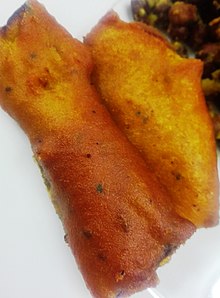| Revision as of 09:22, 17 September 2020 editKingarthur581 (talk | contribs)Extended confirmed users970 edits Added dataTags: Visual edit Mobile edit Mobile web edit Advanced mobile edit← Previous edit | Revision as of 11:31, 17 September 2020 edit undoArjayay (talk | contribs)Autopatrolled, Extended confirmed users, Page movers, Pending changes reviewers, Rollbackers625,705 editsm Duplicate word removedNext edit → | ||
| Line 16: | Line 16: | ||
| |minor_ingredient=}} | |minor_ingredient=}} | ||
| '''Beguni''' ({{Lang-bn|বেগুনী}}) is a common ] snack originating from the ] region. It is made of ] (also known as ''aubergine'' or ''brinjal'') which is sliced |
'''Beguni''' ({{Lang-bn|বেগুনী}}) is a common ] snack originating from the ] region. It is made of ] (also known as ''aubergine'' or ''brinjal'') which is sliced and dipped in gram flour batter before being either fried or deep fried in oil. This dish is also popular in eastern Indian states of Assam and Tripura.<ref>{{cite book |author=Manohar Sajnani |year=2001 |title=Encyclopaedia of Tourism Resources in India |url=https://books.google.com/books?id=vdMNBxOsvrUC&pg=PR22 |publisher=Gyan Publishing House |page=22 |isbn=978-81-7835-017-2}}</ref><ref>{{cite book |author=Jane Grigson |year=2007 |title=Jane Grigson's Vegetable Book |url=https://books.google.com/books?id=Nr2Dna7hx1EC&pg=PA46 |publisher=U of Nebraska Press |page=46 |isbn=0-8032-5994-8}}</ref> A similar European dish is known as ''aubergine fritters''.<ref>{{cite book |author=Sally Miller |year=2008|title=Contemporary Caribbean Cooking |url=https://books.google.com/books?id=2XjV0kPhngoC&pg=PT18 |publisher=Miller Publishing Co. Ltd. |page=18 |isbn=978-976-8079-75-6}}</ref> An almost identical dish is made in the Caribbean, namely in ] and ], called baiganee, consisting of sliced eggplant battered in ] batter. <ref></ref> | ||
| ] in ], ]]] | ] in ], ]]] | ||
Revision as of 11:31, 17 September 2020
 Beguni Beguni | |
| Alternative names | বেগুনী |
|---|---|
| Course | Snack |
| Place of origin | India, Bangladesh |
| Region or state | Bengal region of the Indian subcontinent |
| Associated cuisine | India, Bangladesh |
| Main ingredients | Brinjal (eggplant), Gram flour, Salt, Vegetable oil |
Beguni (Template:Lang-bn) is a common Bengali snack originating from the Bengal region. It is made of eggplant (also known as aubergine or brinjal) which is sliced and dipped in gram flour batter before being either fried or deep fried in oil. This dish is also popular in eastern Indian states of Assam and Tripura. A similar European dish is known as aubergine fritters. An almost identical dish is made in the Caribbean, namely in Trinidad & Tobago and Guyana, called baiganee, consisting of sliced eggplant battered in pholourie batter.


The dish may be prepared by coating eggplant with besan paste and then frying the pieces in oil. The eggplant is usually cut longitudinally (Template:Lang-bn begun) and dipped in a batter of Bengal gram flour with salt and turmeric, and deep-fried in mustard oil. Sometimes a small amount of poppy seeds is added to the batter. Some people prefer adding a small amount of baking powder to the batter to make it crunchier. It is commonly consumed along with puffed rice and is an extremely popular street food in the country's cities. It is normally an evening snack in Bengali households and is a very common component of Iftar in Bangladesh during the month of Ramadan of the Islamic calendar.
Beguni is also a quintessential component of the Bengali monsoon cuisine, where it is consumed along with rice and lentil preparation called Khichuri. It is also served as a snack and consumed with tea.
See also
References
- Manohar Sajnani (2001). Encyclopaedia of Tourism Resources in India. Gyan Publishing House. p. 22. ISBN 978-81-7835-017-2.
- Jane Grigson (2007). Jane Grigson's Vegetable Book. U of Nebraska Press. p. 46. ISBN 0-8032-5994-8.
- Sally Miller (2008). Contemporary Caribbean Cooking. Miller Publishing Co. Ltd. p. 18. ISBN 978-976-8079-75-6.
- Pholourie & Baiganee
- Uses of Tropical Grain Legumes: Proceedings of a Consultants Meeting, 27-30 Mar 1989, ICRISAT Center, India. ICRISAT. 1991. pp. 108, 335. ISBN 978-92-9066-180-1.
